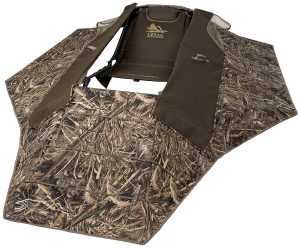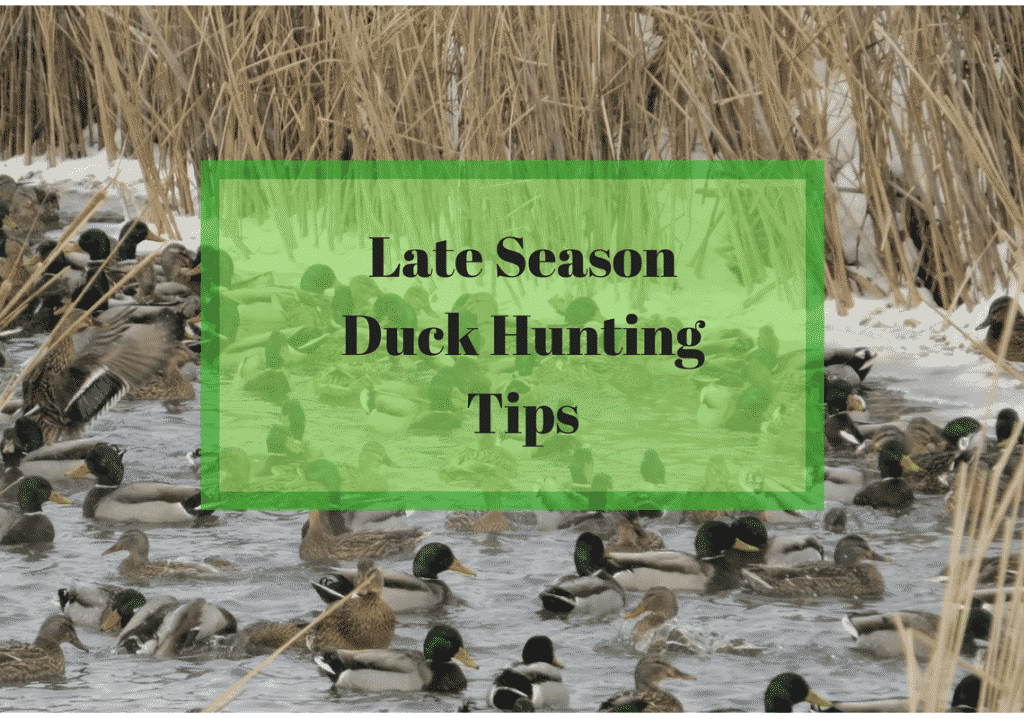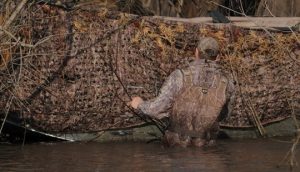Late-season duck hunters are among the toughest men in the forest. Duck hunting in the late winter can be one of the most challenging sports out there. Battling the cold weather and frostbitten fingers to catch a glimpse of the best birds the season has to offer. You’re going after some of the most challenging ducks still left in the sky, but that’s what makes it fun. You’ll have to earn every mallard and goldeneye you collect. Other times you’ll be surprised at how easy it actually is when storm driven birds are forced into every waterhole they can find for shelter.
Late Season Duck Hunting Tips
At the end of the season ducks are going to need all the confidence they can get. They’ve been called and shot at all season and are quick to get spooked. When it comes to calling late-season you’re going to want to find the proper location and hang out. Go where the ducks naturally want to go and call as little as possible. Don’t call when they’re flying towards you, only call when they’re flying away. If they’re flying away give them a little comeback call and hope they turn around.
Break Up Ice After The Freeze
 Duck hunting starts to get difficult after the freeze. After the freeze you won’t be able to find open water often forcing you to break through the ice. It takes a few hours of battling to break up the ice, but there’s a better option. The easiest way to fight the ice is to use a ice eater. When there’s an early freeze I bring along my Taylor Made De-icer to break up the ice. I run it off a small portable generator that I have wired from about 50 yards away. If you have the extra cash a ice eater is definitely the way to go clearing a 50 foot hole in the water. When there’s no other open water nearby you’re almost guaranteed to bring in ducks.
Duck hunting starts to get difficult after the freeze. After the freeze you won’t be able to find open water often forcing you to break through the ice. It takes a few hours of battling to break up the ice, but there’s a better option. The easiest way to fight the ice is to use a ice eater. When there’s an early freeze I bring along my Taylor Made De-icer to break up the ice. I run it off a small portable generator that I have wired from about 50 yards away. If you have the extra cash a ice eater is definitely the way to go clearing a 50 foot hole in the water. When there’s no other open water nearby you’re almost guaranteed to bring in ducks.
If you don’t want to run a generator and de-icer your next best option is to bring along a boat. Small john boats wit a trolling motor will make short work of ice. It’s the perfect solution for a cold water setup since you won’t have to bring along a separate duck blind. All you need to do is carve out a big enough area to get your boat in the water and carve out a 50 yard square. You can quickly carve out the perimeter until you have a large enough area to setup your decoys.
Move to Big Rivers
 If you don’t feel like breaking up the ice yourself you can try looking in big rivers. After most lakes and ponds freeze over, the running water in rivers should offer the last natural open water. In both high water stages and low you should find a few ducks concentrated along open rivers. Look throughout the willows and behind sandbars and small islands.
If you don’t feel like breaking up the ice yourself you can try looking in big rivers. After most lakes and ponds freeze over, the running water in rivers should offer the last natural open water. In both high water stages and low you should find a few ducks concentrated along open rivers. Look throughout the willows and behind sandbars and small islands.
To find them simply launch your boat and quickly cover water searching for signs of life.
To Hunt River ducks simply set up your boat blind with a few dozen decoys and wait. It shouldn’t take long to bring in a small flock. If you don’t feel like setting up a boat blind bring along your favorite layout blind. I bring along my Alps Outdoorz layout blind and dig it into the sand with a few floating decoys in front of my blind. Unless you want to grab your boat every time you down a duck I’d recommend bringing along your dog.
Less is More
Towards the end of the season you’re going to want to avoid over calling. In the late season most ducks will circle and circle trying to figure out who’s calling them. If you call them while they’re coming towards you they are most likely going to pick you out. Try not to let them get a good look in your direction while calling. Wait until they are going away from you and looking into the sun before sending out a come back. It isn’t necessary to constantly use a feed call just to fill dead air.
Use More Camouflage Than You’d Think
I use way more camouflage in the late season than I do the first month or so. In the late season I like to scout extensively and constantly change my location. Since I never know where I’m going to go I have to build a lot of temporary blinds or carry around my layout blind. Since ducks are extremely skittish in these late months you’re going to want to over camouflage. I like to use a lot of camo netting and then covered up with whatever I can find in the surroundings. I try and bring along a few different patterns of netting to match the surroundings perfectly. After I toss on the netting, I like to throw on a lot of willows and cattails with some natural grass and pile it on high.
Don’t just focus on what looks good to you. Wary ducks are going to fly overhead and try and get a good look before they make their approach. Make sure that there’s nothing unnatural about the top of your blind. The easy way to approach this is to simply use a layout blind, but you should still covered up with natural foliage. Your blind should look just like any other bump rising out of the ground.
Use a Small Decoy Spread
Towards the end of the season everything starts to get a little bit spooked. That means you can’t use the same spread that has been successful the rest of the year. Once the ducks start to show their full plumage and start mating off you’re going to want to reduce your spread. They’ve been called to one shot at so much that they are going to become decoy shy. At the beginning of the season I like to set aside a few of my favorite decoys so that they are as fresh as possible in the later months. Make sure they are bright and natural looking so that they draw a lot of attention.You shouldn’t need more than five decoys towards the end of the season.
Keep Your Gear Dry
If you haven’t already cleaned your gun this late in the season you should get around to it. Gun cleaning should be like a religion in the later months, it must be done regularly. You should be almost obsessive about cleaning your shotgun to avoid malfunctions. In the extreme late-season malfunctions will occur if you don’t properly lubricate and clean your shotgun. I like to use a dry lubricant like Hornady’s One Shot Gun Cleaner and Lube. The dry lubricant cleans up and lubricates your action without building up. Oil and petroleum based lubricants will quickly gunk up and slow down your action.
Take extra precautions when hunting with semi-auto shotguns and other gas operated shotguns. They need to be broken down and cleaned more frequently than their break-open cousins. Make sure you remove all the carbon buildup found in the gas piston and around the magazine tube. If your gun is particularly dirty try a little bit of mineral spirits wiped on with a rag.
Scout For Activity Before The Hunt
You can have all the best gear, but if you don’t know your area you aren’t going to have any luck. You can go out without any feeders a dozen decoys and have success if you know where to look. Just try and hunt where ducks are most likely to be and you’ll have success. It’s especially important to scout ahead late in the season when ducks get decoy shy. Throwdown a few decoys and they’ll be all over them.


